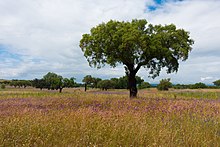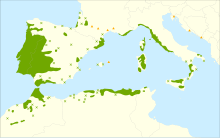| Cork oak | |
|---|---|

| |
| Cork oak in its natural habitat | |
| Scientific classification | |
| Kingdom: | Plantae |
| Clade: | Tracheophytes |
| Clade: | Angiosperms |
| Clade: | Eudicots |
| Clade: | Rosids |
| Order: | Fagales |
| Family: | Fagaceae |
| Genus: | Quercus |
| Subgenus: | Quercus subg. Cerris |
| Section: | Quercus sect. Cerris |
| Species: | Q. suber
|
| Binomial name | |
| Quercus suber | |

| |
| Synonyms[2] | |
|
List
| |
Quercus suber, commonly called the cork oak, is a medium-sized, evergreen oak tree in the section Quercus sect. Cerris. It is the primary source of cork for wine bottle stoppers and other uses, such as cork flooring and as the cores of cricket balls. It is native to southwest Europe and northwest Africa. In the Mediterranean basin the tree is an ancient species with fossil remnants dating back to the Tertiary period.[3] It can survive for as long as two centuries. Typically, once it reaches 25 years old, its thick bark can be harvested for cork every 9 to 12 years without causing harm to the tree.[4]
It endures drought and makes little demand on the soil quality and is regarded as a defence against desertification. Cork oak woodlands are home to a multitude of animal and plant species. Since cork is increasingly being displaced by other materials as a bottle cap, these forests are at risk as part of the cultural landscape and as a result animal species such as the Iberian lynx and imperial eagles are threatened with extinction.[5]
- ^ Barstow, M.; Harvey-Brown, Y. (2017). "Quercus suber". IUCN Red List of Threatened Species. 2017: e.T194237A2305530. doi:10.2305/IUCN.UK.2017-3.RLTS.T194237A2305530.en. Retrieved 19 November 2021.
- ^ "Quercus suber L.". World Checklist of Selected Plant Families. Royal Botanic Gardens, Kew – via The Plant List. Note that this website has been superseded by World Flora Online
- ^ Eriksson, E.; Varela, M.C.; Lumaret, R. & Gil, L. (2017). Genetic conservation of Quercus suber (PDF). European Forest Genetic Resources Programme (EUFORGEN), Bioversity International. ISBN 978-92-9255-062-2.
- ^ "Cork Oak". Rainforest Alliance. Retrieved 2024-04-28.
- ^ "Put a cork in it!". WWF. Retrieved 13 February 2021.
